 Petzlover
Petzlover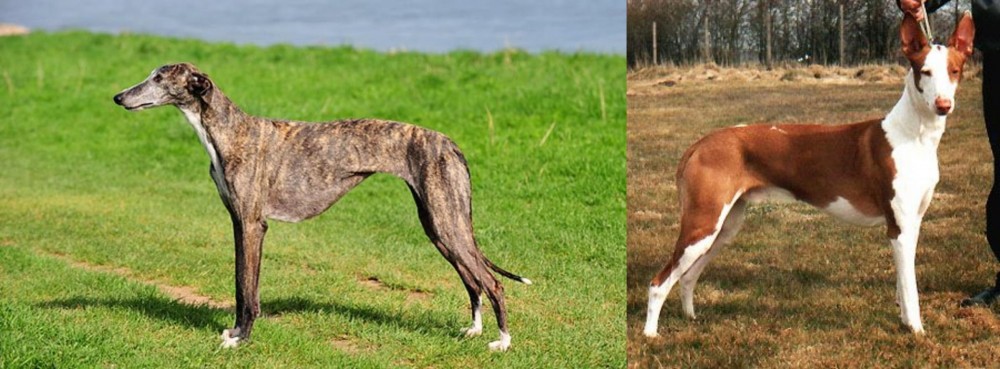 Both Galgo Espanol and Podenco Canario are originated from Spain. Both Galgo Espanol and Podenco Canario are having almost same height. Both Galgo Espanol and Podenco Canario are having almost same weight. Both Galgo Espanol and Podenco Canario has almost same life span. Both Galgo Espanol and Podenco Canario has same litter size. Both Galgo Espanol and Podenco Canario requires Low Maintenance.
Both Galgo Espanol and Podenco Canario are originated from Spain. Both Galgo Espanol and Podenco Canario are having almost same height. Both Galgo Espanol and Podenco Canario are having almost same weight. Both Galgo Espanol and Podenco Canario has almost same life span. Both Galgo Espanol and Podenco Canario has same litter size. Both Galgo Espanol and Podenco Canario requires Low Maintenance.
 Galgo Espanol means Spanish with galgo meaning greyhound, thus a Spanish Greyhound. This breed is ancient with their roots in perhaps the English greyhound and others in the sighthound family. They are much like the greyhound in that they are laid back, calm, gentle and quiet, unless they are competing on the local track. Like the greyhound they are shy and reserved; great with kids and other pets. And of course, they love cats.
Galgo Espanol means Spanish with galgo meaning greyhound, thus a Spanish Greyhound. This breed is ancient with their roots in perhaps the English greyhound and others in the sighthound family. They are much like the greyhound in that they are laid back, calm, gentle and quiet, unless they are competing on the local track. Like the greyhound they are shy and reserved; great with kids and other pets. And of course, they love cats.
There are dogs like the Galgo referred to in writing by the ancient Celts and Romans. One author, Arrian, had his own Galgos and used them when hunting. The breed flourished in the second half of the Middle Ages in Spain and well into the 8th century. When the Christians regained control of the Iberian Peninsula, they did away with the hunter old forms of hunting and introduced a new form with hounds that made the Galgo the pride of the aristocracy and not in the homes of the ordinary people. Arrian claim to two types of dogs, the smooth and rough coated.
Muslim and Chrisitan Kings kept Galgo Espanols. In all probability the Saluke and Galgo were crossbred at this time. It was illegal to kill a Galgo and in 1081, the Mayor of Cartuario of Slonza left his Galgo in his will to Diego Citid. Dogs seen in painting from the 12th century look just like dogs of this breed who can be seen today.
It is believed that when the Galgo was developed, it was in the midsection of Spain or the Castillian plains. They ruled the interior of the country while the bloodhound ruled the exterior. The 18th and 19th centuries saw very little change in the breed. However, in the 20th century, there was cross breeding with the English greyhound that produced a leaner, faster and powerful track racing dog. The results was a faster dog without the long distance stamina of the pure Galgo. For this reason, the breeders returned to breeding the pure professional racing dog.
The sport of racing the Galgo earns Spain around sixty million dollars per year. They train anywhere from three to four thousand of the Galgos every year for Open Field Coursing Championships. Still, there no longer is any cross breeding between the Greyhound and the Galgo. The current coursing programs feature a hare that is much hardier and difficult to pursue so the stamina of the old Galgo Espanol is desired. In Castile, where these games are played, the landscape is open with large fields that requires that the hare travels far greater distances. This means that the stamina of the original Galgo Espanol is needed.
When not racing the Galgos have become great house pets. They have a reputation as gentle dogs that are docile and quiet, with good health. This reputation is well earned. They are also successful show dogs in Europe much more than the states. This is perhaps because they are really rare outside of Spain. They are not recognized by the United Kennel Club nor the American Kennel Club.
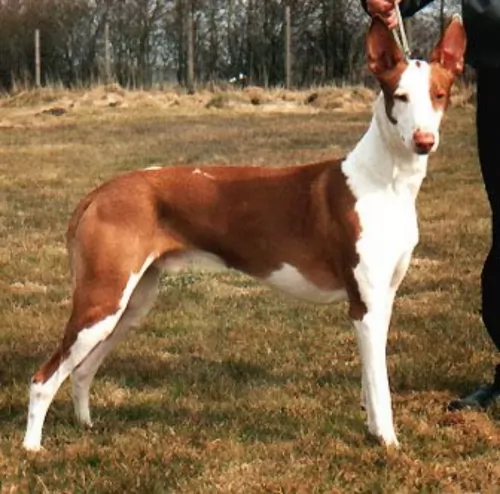 The Podenco Canario comes from the Canary Islands (Spain) and is still used for hunting purposes to this day, although it is also becoming more of a companion dog.
The Podenco Canario comes from the Canary Islands (Spain) and is still used for hunting purposes to this day, although it is also becoming more of a companion dog.
It is believed that the dog descended from ancient dogs which were brought to the islands from Egypt and North Africa by early human settlers.
 Obviously the Galgos looks a lot like the Greyhound, but in some very important ways they are very different. The rear of the Galgos is higher than the front and their muscle are flatter. They are built for endurance while the Greyhound is built for speed. The Galgos is a lighter, smaller dog with larger ear on a long head. They have long tails and their chests are not deep like the Greyhounds.
Obviously the Galgos looks a lot like the Greyhound, but in some very important ways they are very different. The rear of the Galgos is higher than the front and their muscle are flatter. They are built for endurance while the Greyhound is built for speed. The Galgos is a lighter, smaller dog with larger ear on a long head. They have long tails and their chests are not deep like the Greyhounds.
The Galgo comes in smooth and rough coats and a variety of colors. The rough coat protects dogs that are in climates colder than the ones in Spain and also keeps them from injuring their skin while running. The colors include brindle, black, golden, toasted, cinnamon, yellow, red, white, white with patches, or any color as long as they have a white forehead and muzzle.
 The Podenco Canario is a medium sized dog and stands at between 55 and 64cm and weighs between 20 and 25kg. This is a slender, muscular dog but still robust and sturdy. There are in fact 2 sizes of Podenco Canarios – one is the medium sized dog of up to 64cm and the other is a smaller size.
The Podenco Canario is a medium sized dog and stands at between 55 and 64cm and weighs between 20 and 25kg. This is a slender, muscular dog but still robust and sturdy. There are in fact 2 sizes of Podenco Canarios – one is the medium sized dog of up to 64cm and the other is a smaller size.
The coat of the dog is short and smooth and is a rich red color or even chocolate brown. There are dogs which can have some white markings. The dog's nose and skin should be a shade of red and these dogs are known to blush when they become animated. The neck of the dog is long with the head being long and slender too, with the large bat-like ears being erect.
This dog can become very attached to his human family and is somewhat reserved around strangers. He is smart and will be able to learn easily. Training and socialization will be necessary to him as it makes him balanced and obedient.
He will appreciate a firm, consistent, kind owner as he is a dog that is strong willed and stubborn. He is a gentle dog too and can play well with children who have been taught to treat dogs with respect. He is active and will require a good deal of daily exercise.
 They are good with children, but you need to be careful no one gets knocked down or hurt.
They are good with children, but you need to be careful no one gets knocked down or hurt.
Stamina for running and a good record in lure coursing.
Though they can be couch potatoes like greyhounds they are better off with a fenced yard and not an apartment.
They are smart and can learn anything you want to teach them if you can keep their attention.
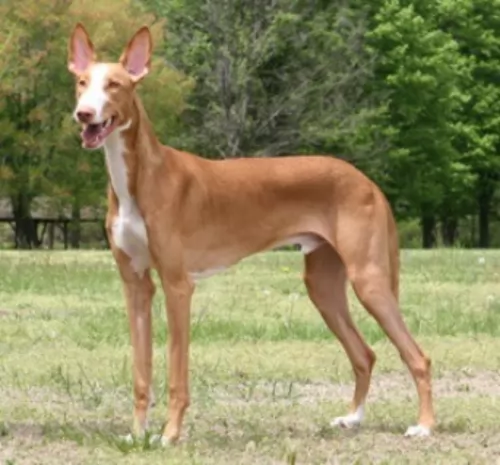 The Podenco Canario is a quiet breed that isn’t going to cause you trouble as he just slots into your way of life.
The Podenco Canario is a quiet breed that isn’t going to cause you trouble as he just slots into your way of life.
He is easy going, gentle and smart and wants to please. He is also a low maintenance dog, easy to please if he benefits from a good dose of exercise and human interaction.
Early socialization and training is important, as with any other dog breed, and then he becomes an excellent pet and friend of the family.
 Being a large dog, the Galgo Espanol would normally face a high probability of hip dysplasia. Fortunately for the breed this is not true. In this respect their lightness of weight, their history as a working dog and their anatomy have protected them from it. They are however susceptible to other issues.
Being a large dog, the Galgo Espanol would normally face a high probability of hip dysplasia. Fortunately for the breed this is not true. In this respect their lightness of weight, their history as a working dog and their anatomy have protected them from it. They are however susceptible to other issues.
Malignant tumors that quickly spread throughout the body. Life threatening.
As a sighthound, the Galgo Espanol is prone to have issues anytime with anesthetics. They don’t metabolize the anesthetics like other dogs do. They will take longer to revive, and they are susceptible to hypothermia while under an aesthetic.
While running, they are prone to injuries
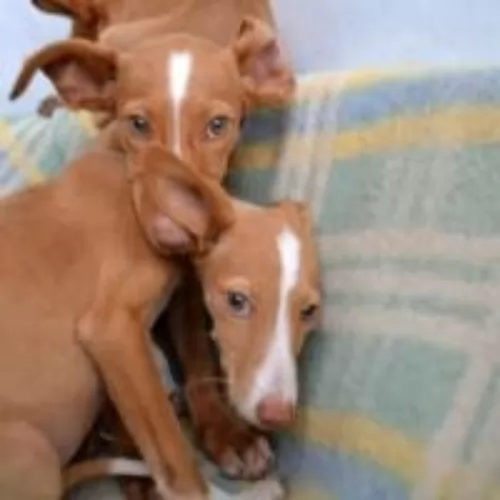 Your Podenco can live to be 10, 11 or 12 years of age if looked after well. Because he is a primitive breed, he is able to throw off some diseases that other dogs might battle with. Just like with other dogs however, he can battle with some health problems. One of two of the common dog illnesses to watch out for include -
Your Podenco can live to be 10, 11 or 12 years of age if looked after well. Because he is a primitive breed, he is able to throw off some diseases that other dogs might battle with. Just like with other dogs however, he can battle with some health problems. One of two of the common dog illnesses to watch out for include -
Skin problems can create havoc for your dog. They can be frustrating, painful and itchy. Skin problems can come from parasites, allergies and skin infections. Common parasites that involve the skin include ticks and fleas and mites. Dogs themselves can also cause irritation of the skin by licking one area over and over again from sheer boredom and stress.
To prevent this life threatening disease, try and feed your dog 2 meals a day instead of one so that he doesn't gobble his food up. This can contribute to bloat. The stomach fills with gas and the stomach can twist and bring death to the dog. Get your dog to the vet immediately if you see he is restless,drooling and has a swollen stomach.
This is particularly worrisome if you live in an area where there are lots of mosquitoes. Heartworm infections can be deadly for your dog. Speak to your vet about preventative treatment if you are traveling to an area known for its mosquito problems..
 Feed your puppy a high quality dry food made for large breed dogs. Feed 3 meals a day 2.5 to 3 cups total for the day.
Feed your puppy a high quality dry food made for large breed dogs. Feed 3 meals a day 2.5 to 3 cups total for the day.
Feed your adult Galgo a high quality dry food made for large breed dogs. Feed 2 meals a day but don’t overfeed Give 4-5 cups total for the day.
They have amazing stamina and good speed. Generally good health as a breed.
He can be a couch potato indoors and runs forever outdoors. He does need daily exercise and bedrest both. The best would be if you could sprint him every day or have a small yard he can play in. They excel of course at agility and lure coursing. Keep them on a leash because if they run you will never catch them. The American Sighthound Field Association presents lure coursing events that they are eligible for. They have exceled at show competition in Europe but are not well known in the U.S.
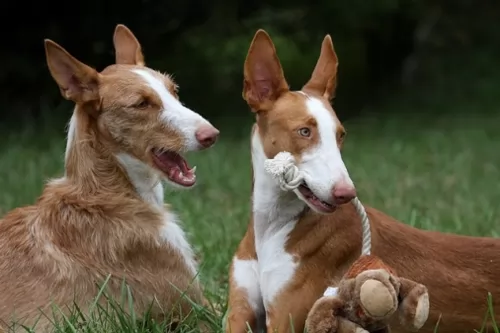 Provide your dog with a daily dose of exercise. He will love to have a walk with you every day but ball games will also be important for him.
Provide your dog with a daily dose of exercise. He will love to have a walk with you every day but ball games will also be important for him.
Your Podenco Canario is a medium-breed dog, with a slim, muscular build To keep him that way, ensure he has a high quality commercially manufactured dog food that is high in the vitamins and minerals he needs.
Dry kibble needs to be enhanced with some home-made food. Boiled chicken, brown rice, sweet potatoes, carrots and spinach are excellent when chopped up and added occasionally to the dry kibble. You can also include some raw meat into his food from time to time. Such nutritious food which is simple, can help your dog live a long, healthy, happy life.
Your dog has a short coat and a brush twice a week will keep it in tip top condition. Make use of these brushing sessions to check your dog’s coat for fleas and ticks. Also check him over for any new lumps. Cancer is an ever present threat with dogs.
Look inside his ears for any signs of redness, and try and look inside his mouth too for signs of bad teeth. His nails should also be kept short and trimmed. If they get too long they can hook onto things and rip the flesh open.